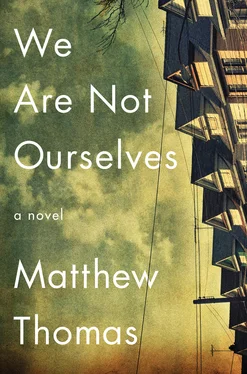Part VI. The Real Estate of Edmund Leary, 1997–2000
She had a hard time leaving him at night. It was better not to say good-bye. She’d tell him she was going to run an errand or to take a nap — trying to imply, in the way she said it, that she’d be returning. “I just need to run to the store,” she’d say, and then mechanically make her way through the corridors and out the back door, the whole time telling herself she could turn around and go back.
Once, when she said, “I’m going to get something to eat,” he seemed to laugh sardonically, and she looked at him, trying to find a deliberate message in his expression, some chastening meant for her, but she saw only that familiar blankness as he stared at something she couldn’t see. This disease was making her paranoid too.
She went every day. She never accepted the invitations for weekends in the country or at the beach. Her friends said she was being too hard on herself. She thought she was being too easy. I could bring him home , she wanted to say. I could take care of him . They told her she needed to have some semblance of a life, that it was too much. And she thought, It’s not enough. I’m a nurse, for God’s sake, that’s what I do , but all she said was, “I’m fine. I’m fine. I’m fine.”
• • •
His wallet was still on the mule chest. She rubbed her fingers on the worn, smooth leather, took out the driver’s license and looked at it, read the prayer they’d written together. Inside was everything she’d allowed him to carry in his final ambulatory years, and everything he’d been carrying on his last day as a full-dressed member of civilization: seven dollars cash; an index card listing his name, address, and phone number and her work phone number, written in her own hand; his Alzheimer’s Association Safe Return card (“If I appear lost or confused, please help me by calling…”); his Mobil and Amoco gas cards; his AAA card (“Membership year 27”); two different Board of Elections voter registration confirmations; his Waldbaum’s Valued Shopper Card with Check Cashing Privileges; his PriceCostco card under Jack R. Coakley Consulting; his AARP card; his ID from BCC; an index card with the number for the car phone; his Sears card (“Valued Customer Since 1973”); his Blue Cross/Blue Shield card; his GHI card; his PSC–CUNY card indicating he was a member in good standing of the AFT Local 2334 (AFL–CIO); his New York Academy of Sciences membership card; a picture of her from June of 1968, when she had been thin; a picture of Connell in his baseball uniform from his freshman year of high school; a picture of Connell from preschool; a picture of Connell graduating from St. Joan of Arc; and the edited index card with her size written on it. She opened the card. She was going to cross the “10” out and write “12” in its place, and then throw it in the garbage, but when she saw that the “10” was in her own handwriting, the tears came all at once.
• • •
His roommate was named Reinhold Huggins. Mr. Huggins had been a celebrated piano teacher. Now he pushed a walker around and refused to wear an undershirt under his hospital robe, his naked back bisected by the tight string, his steps tiny and shuffling, his posture slightly hunched. He was surprisingly alert. He didn’t say anything unprompted, except to ask for water, but if she asked how he was doing he would say, “Rather well, thank you, and yourself?” always quietly and gently, so that she had to lean in to hear him, and without the rising intonation that would have made the statement a question. Despite his manner of speaking, he was fearsome-looking, with a hoary, streaked beard and an unsmiling visage. The one time she had tried to direct him to the piano in the lounge, he gripped her shoulders with his long, bony fingers and squeezed hard. She didn’t do it again. Often when he spoke or sat in his chair, he raised his forefinger and beat it back and forth like a metronome. Other than that, he wasn’t a bad roommate; there were worse in the building.
Mrs. Klein and Mrs. Sonnabend liked to sit in the lounge and talk by the picture window. Eileen was surprised at how present they were. Watching from a distance, she became convinced, by their facial expressions, laughs, hand gestures, and the way they interrupted one another to make an excited point, that they were gushing over their grandkids. After she’d seen them there enough times, she grew fascinated enough to get up close to listen in. Mrs. Klein said, “My daughter, my daughter, she’s going to come, my daughter, with a hundred dollars,” and Mrs. Sonnabend responded, over and over, with something that sounded like “Gesundheit.”
• • •
On December 2, 1997, she made it to her ten-year pension. Before she left for work, she called Connell in Berlin, but he wasn’t home, and she was almost relieved not to get him. She wasn’t sure he’d have appreciated the full significance of the news, and she didn’t want to feel silly or diminished about it, so she left a message for him to call her and figured she’d hear from him in a week or so, when it would be just another curiosity to report. On this day, the actual day of the event, she felt too raw to mention anything about it and risk not hearing back from him. It meant more to her than she would ever have guessed it would. She hadn’t always been sure she’d get to this day, and it wasn’t even about health insurance anymore so much as having something to strive for, something that allowed her life to hang together.
She went to the home after work with a half bottle of champagne. A drum circle had been organized in the community room; Kacey the social director was standing in the center, her own drum suspended from a strap around her neck. Eileen stopped in the doorway to watch. Kacey was slapping at her drum, which was fancier than the others, and looking at the patients with a manic grin, trying to get them to imitate her. The gathering was mostly women, though a few men were scattered throughout. Eileen was glad Ed’s physical infirmity kept him out of activities like this. She watched long enough to hear the haphazard drumming peter out. Kacey slapped each hand down once in quick succession, generating a popping sound like that of a plastic cup hitting a hardwood floor. “Now you!” Kacey said, earnestly, casting about with imploring eyes. An old woman sighed and said, “Oh, come on ,” and Eileen wanted to hug her in gratitude.
She found him in his room. The popping cork startled him; his eyes widened, though he didn’t move. She had to pour the champagne slowly into his mouth to keep him from dribbling it all out, but once he could feel the bubbles on his tongue he lapped it up. She could have sworn she detected a smile on his lips when she told him her news.
For years she had imagined she might be moved to retire the day she’d secured the pension, but as she sat there finishing off the little bottle, she realized that even if her financial situation had worked out better, and even if the cost of the nursing home didn’t go up every six months, to almost seven thousand a month now, she wouldn’t be giving a passing thought to quitting. If she retired she would have nothing to do but spend all day at the home, and she still had some life left to give. One of the inescapable facts of her existence was that she was good at her job. She had spent her life thinking of all the other things she might have been — a lawyer, she’d often concluded, or a politician, which was probably the best career for any child of Big Mike Tumulty’s, even if that child didn’t happen to be male — but now it struck her that she was doing what she did best. Her profession had been becoming hers the whole time she’d been looking away from it. The point wasn’t always to do what you want. The point was to do what you did and to do it well. She had worked hard for years, and if she had nothing to show for it but her house and her son’s education, there was still the fact of its having happened, which no one could erase from the record of human lives, even if no one was keeping one.
Читать дальше
Конец ознакомительного отрывка
Купить книгу












